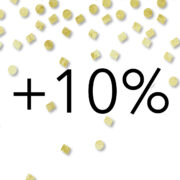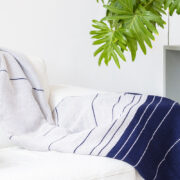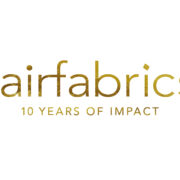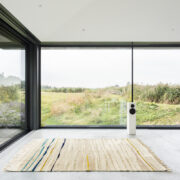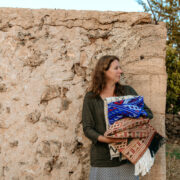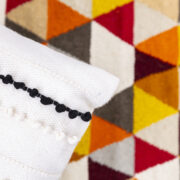Commissioned by our client NRC, we designed a rug and cushion set and had it made in two specialist workshops in respectively Tunisia and Morocco. Both products are made in a small, numbered edition and are exclusively for sale in the NRC webwinkel from Saturday 29 May.
Would you also like to have an article made by Fair Fabrics? Check out our “corporate” page or click here.

The rugs are handcrafted by the members of a women’s cooperative in a small mountain village in northern Tunisia. The weavers’ many years of experience ensures tight weaving, creating a rug of high quality. All affiliated women are now working together on the growth and professionalization of their studio. All rugs are provided with a label with the name of the maker.
Rugs create the atmosphere in the house and offer a lot of extra comfort. They improve the acoustics, make the interior personal and insulate in both summer and winter. This specific pattern has already been used for another rug. Especially for the NRC, Fair Fabrics had the rug made in a different color composition in a handy format, so that it fits in several places in the house.

Photo: Geert van Hertum – Location: Gallery Untitled, Rotterdam
The combination of old techniques with this contemporary pattern gives your interior a pleasant atmosphere and is a real eye-catcher. Rugs are very nice for the layout of your living space. You can break a large space with it, while a small space with a rug gets depth and thus appears larger.
The cushions are handmade by a weaving cooperative in Central Morocco. The cooperative supports homeless and problem youth from the immediate vicinity through its own studio. By learning a trade, they offer these people a new perspective for the future. The weavers have years of weaving experience and only use high-quality materials. All cushion covers are labeled with the maker’s name and uniquely numbered.

With new cushions you can personalize your interior in a stylish way with a small gesture. The designer has made a combination of traditional technology and local craftsmanship, in a contemporary design. The cushions each have their own design and together form a tasteful whole. They are lined on the inside and have a double zipper at the back.
Both articles were developed in collaboration with the Dutch designer Willemiek van Kuijlenborg.

Photo: Geert van Hertum – Location: Gallery Untitled, Rotterdam – Chair: Floris Hovers
Link to the rugs, link to the cushions
We took some of the above photos in Gallery Untitled in Rotterdam.
The white chair in the photos is by the Dutch designer Floris Hovers, from the SOO furniture collection.
For the packaging we have used recycled tubes from SCRAP XL.
Our logistics processes are carried out by Onze Zaak, a sheltered workplace that helps people with intellectual disabilities and people at a distance from the labor market find daily work. https://www.onze-zaak.org
Would you also like to have an article made by Fair Fabrics? Check out our “corporate” page or click here.

Photo: Geert van Hertum – Location: Gallery Untitled, Rotterdam – Chair: Floris Hovers

Photo: Geert van Hertum

Photo: Geert van Hertum – Location: Gallery Untitled, Rotterdam

